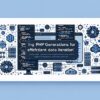Practical WordPress Performance Optimization Techniques

Brush off the Dust – It’s Time for Performance Tuning!
Every website needs a little spring-cleaning from time to time, and trust us, our dear WordPress isn’t an exception. So put on your utility belt, grab your mop (code editor), and let’s scour through your WordPress site to make it squeaky clean and faster than The Flash on a caffeine rush!
Believe in the Power of Caching
Remember when you hid cookies from your younger self to munch on later? Caching in WordPress is a very similar concept! It sort of ‘remembers’ your website data and delivers it to your visitors promptly, making your website load faster. Two popular caching plugins are W3 Total Cache and WP Super Cache. You know what they say about caching – Once you cache, you never go… mhm, you got the idea!
Optimize Your Images like a Pro
Images consume bandwidth like there’s no tomorrow! Never ignore the fact that oversized and uncompressed images are speed killers. Plugins like Imagify and WP Smush can help optimize your images and breathe new speed into your WordPress site. But remember, with great imagery comes great responsibility.
The JavaScript and CSS Minification Magic
If code was poetry, minification would be the haiku of it! Imagine making your CSS and JS files so tiny that they almost disappear (just kidding, they wouldn’t!). But yes, minifying them does reduce their size, leading to faster page loads. Plugins like Autoptimize do this job quite nicely. But let’s face it – nothing in life is perfect, and you may have to manually intervene if the minification messes up the design. Getting hands-on is the hidden charm of coding after all!
Use a Content Delivery Network (CDN)
Even faster than your local pizza delivery guy, a CDN copies your website’s data and stores it on several servers around the world. This means that a user in Timbuktu can access your site just as quickly as someone sitting next to you. Cloudflare and Jetpack are few of those stellar CDNs that work seamlessly with WordPress. Just don’t tell your delivery guy we’re comparing him with a CDN!
Keep WordPress Updated – Always!
We understand updating can be a hassle! It sometimes feels like those updates pop up right when you’re preparing that delicious sandwich. But updated versions come with bug fixes, enhanced features, and most importantly, performance improvements that help to improve site speed.
Carefully Choose Your Plugins
It’s easy to get lost in the WordPress plugin ocean. It’s tempting to download them all! But resist, resistance is not futile! More plugins mean more resources are used up from your server. So, say NO to plugin gluttony and choose ONLY what you need.
Wrapping Up
Getting your WordPress site to perform at its best significantly improves user experience and enhances your site’s SEO score. With tools and techniques at your fingertips, it’s your turn to step into the spotlight and give your WordPress website all the love and attention it needs!
Remember, beauty isn’t only skin deep, but neither is website performance. Optimizing your WordPress site is more satisfying than watching those televised home makeovers. So, roll up your sleeves and let’s get optimizing!


